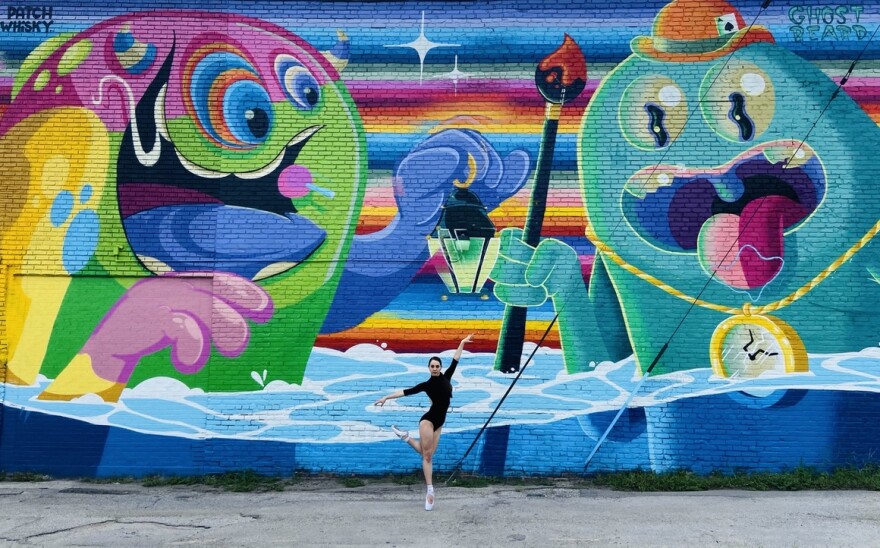This story was first published in KCUR's Creative Adventure newsletter. You can sign up to receive stories like this in your inbox every Tuesday.
There are well over 200 murals in the Kansas City metro, so ubiquitous that we are as much The City of Murals as we are The City of Fountains.
This public art form adorns not only walls but sidewalks and roads, alleyways, utility boxes, fences, garage doors and even streetcars. Inside, outside and on the underside of bridges, the entirety of our built landscape is a potential canvas.
As with any public art, murals are art for the people, accessible and free to enjoy. They're a means of expressing civic pride, celebrating our histories, broadcasting our values and attracting visitors. Sometimes they're a method of advertising, storytelling or just good old displays of artistry.
Murals can simply serve as a backdrop to your exploration or be the entire purpose of your excursions around town. Whatever your approach, these large-scale works of art are worth a closer look.
Messages from history

We’ve had murals in our public spaces for nearly 100 years in Kansas City, though walls of art (and ceilings and floors) are a millennia-old concept. During the 1930s and 1940s, funding from the Works Progress Administration and a penchant for American regionalism helped artists create murals that reflected our communities and everyday scenes.
At the mercy of nature and the whims of passersby, murals are at constant risk of damage and deterioration. Many displays from the early days are no longer visible, as the buildings they adorned were demolished and the artwork either destroyed or (in luckier circumstances) moved to a new location or into storage.
But we can still see remnants of what might have been with the shadows of faded signs from businesses long gone, and — while acknowledging their precarity — appreciate the vibrancy our current murals offer to our environment.
Thomas Hart Benton is probably the best known of our local historic muralists, and you can see some of his work in the Nelson-Atkins Museum of Art and in the Thomas Hart Benton Home & Studio State Historical Site, where a smaller scale version of his Harzfeld's Department Store mural is displayed (the original is featured in the Smithsonian).
Eric Bransby studied with Benton at the Kansas City Art Institute (where many of our contemporary muralists also studied) and was a professor at the University of Missouri-Kansas City for 20 years. His first mural, “Westport Landing” (1942), was for Paseo High School, in a building no longer there. But his unique multi-paneled later works can be seen in the UMKC and Rockhurst University libraries.
UMKC also has historic murals by artists Luis Quintanilla and Joseph Fleck in Haag Hall, watching over students and faculty as they navigate their academic days.
Art, community and values

With urban expansion eroding the distinction between the metro areas, murals help define the uniqueness of a neighborhood. But murals aren’t necessarily just about urban beautification. They can illustrate the history of an area or a particular building, to enrich an environment or exhibit a region’s values.
One of our newest murals is in Roeland Park, Kansas, which unveiled its latest installation of public art in October on an expansive, curved retaining wall along 47th Street. Seven artists worked together to show the history and diversity of the community.
An earlier mural in the region is the “Anthology of Argentine” mural in Kansas City, Kansas, which was painted in 1998. The block-long wall along Metropolitan Avenue is 660 feet long, 23 feet wide and the mural took seven artists and a cadre of high school-age volunteers to complete. This mural follows the history of the region, shared by Indigenous, Black, white and Latino people.
In September 2020, several communities came together to create street installations for the Black Lives Matter movement in major thoroughfares throughout the city. These public art installations were designed by some of Kansas City’s most respected artists with hundreds of volunteers pitching in to help bring their visions into reality.
Discover murals in all shapes, sizes, and designs in Midtown, Overland Park, Westport, Crossroads, Kansas City, Kansas, North Kansas City and the Historic Northeast, as well as 18th & Vine, Troost, Downtown, Country Club Plaza, West Bottoms and River Market.
Mural love

Vibrant street art is like opening a window into a fantastical dimension. As part of our appeal as a creative city, murals are frequently featured on Kansas City’s Google Arts & Culture site, attractive to locals and visitors alike.
Murals can also send a message of civic pride. There are a number of Kansas City-focused murals, including “#KCLoves” (best viewed from the garage at 1720 Main St.), “Kansas City, I’m So In Love” (2010 McGee St.) and “Love Kansas City” (421 Southwest Blvd).
You can also see a series of “postcard” murals in neighborhoods across town, including Brookside and Waldo. The Kansas City Public Library’s “Community Bookshelf” (a facade of three-story-tall book spines on the library’s parking garage) is already internet famous.
In 2017, the Royals launched a #RaisedRoyal mural campaign, adding six murals to the cityscape. The Kansas City football team and their fans, too, have encouraged dashes of red on walls from Overland Park to Westport. For Sporting KC, the slogan “For Glory, For City” emblazons the Globe Building, while just a block away a 90-foot banner proclaims, “We Want The World Cup."
The Monarchs of the Negro League era and Kansas City legend Buck O’Neil are depicted on the historic Paseo YMCA. Now we just need a few Kansas City Current murals to complete the set.
Rural communities have also taken note of the benefits of public arts. The Kansas News Service shared how rural murals — including entire grain silos — attract attention and rejuvenate communities.
Meet the muralists

Kansas City boasts quite a few well-known muralists who are regular contributors to our city’s vivid environment. Their artistic vision transforms bland, utilitarian surfaces into bold and captivating works of art.
Jose Faus, Alisha Gambino and Jesus Ortiz created the “Lewis and Clark 1804” mural for the Corps of Discovery bicentennial (with touch-ups happening this past summer) and the “Town of Kansas 1850.” Faus and Gambino also oversaw several of the works featured on the Avenue of Murals in Kansas City, Kansas.
Artist and art educator Michael Toombs leads many community art projects in the Kansas City region, with work at the American Jazz Museum, the 2018 "Brown v. Board of Education" mural in Topeka and the Black Lives Matter project in Kansas City.
Wandering around town, you’ll soon recognize the prolific work of Phil “Sike Style” Shafer, Alexander Austin, JT Daniels and Donald “Scribe” Ross, who also serves as artist-in-residence for Children’s Mercy Hospital.
Multifaceted murals

Murals are more than paint on a wall. From chaotic and cartoonish to geometric and urbane, there’s a story hidden in every panel. While there are quite a few (somewhat perfunctory) self-guided tours, there are also opportunities for more immersive storytelling, with the likes of an Urban Hikes mural tour.
When theaters and art galleries shut down in the early days of the pandemic, some saw murals as the perfect opportunity for artistic stimulus. In August 2020, ballet dancers Danielle and Liang Fu started sharing images of themselves and their dancer friends leaping and arabesque-ing in front of murals here and elsewhere, kinetic shots that married the artistry of movement and mural in the Instagram series “Dancing With Murals.”
“I needed to pivot my focus on what I could do in a time when the world seemed to stand still. The streets were essentially empty, which I think made the art on the walls more visible to me,” said Danielle Fu. “The colors or the images inspired the outfits and the poses. I didn’t want to take away the focus from the mural itself, so I tried to be a part of it. A collaboration that could inspire.”
Each summer, Art in the Loop curates temporary, outdoor art installations, including a decorative “skin” for the KC Streetcar. "Jazz: the Resilient Spirit of Kansas City" by Hector E. Garcia was featured this year on KC Streetcar Vehicle #804. Another honors the NLB Monarchs and Buck O’Neil.
RideKC's Instagram highlights different murals along transportation routes each week with #MuralCrushMonday.Making mega murals

Murals require considerable planning and deliberate execution. After all, it took Michelangelo four years to paint the ceiling of the Sistine Chapel in the Vatican.
Making murals is often a community endeavor, funded by grants and neighborhood development foundations, and sometimes going through rounds of voting and permit requests. Creating a mural takes many hands, with school groups, family members and friends pitching in, and usually, specialized equipment, to fully cover the art space.
On the other hand, graffiti is the ultimate public statement of ad hoc expression. Many a muralist got their start with surreptitious spray painting. Nevertheless, there are ways to get involved with the mural movement, including volunteering, donating and identifying locations, without potentially committing a misdemeanor.
Since 2017, the SpraySeeMo festival has added over 100 murals to Kansas City’s walls, most on and around the Crossroads Arts District. You can find all the locations, with artist credits, on this map and follow progress on Instagram during the festival each September.
At this rate, Kansas City may not have much blank space left. Instead, you’ll find bold, artistic statements showcased on every wall, around every corner.
Want more adventures like this? Sign up for KCUR's Creative Adventure Email.






